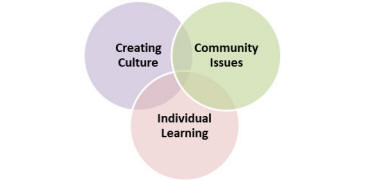|
Problem Statement:
|
·
Youth have little Community
·
Peer Tutoring/Activities not understood
·
Craft-Skills (jewelry making, )
|
|
Value Statement:
|
·
Building Relationships
·
Fun & Social Events
·
Developing Life Skills
(College & Career Readiness skills)
·
Competitive Activities with other clubs
(like sports/Music Teams)
|
|
Past History:
|
"The secret to the rapid diffusion of these
organizations was a kind of “sociability in a box”
—handbooks that explained the organization of a local
chapter, mission statement, code of ethics, officers and
committees, membership obligations (such as attendance
at weekly meetings), slogans, meeting rituals designed
to build solidarity (for example,"
― from "The Upswing: How America Came Together a Century
Ago and How We Can Do It Again"
|
|
Club Owner:
|
Mothers/Fathers in a neighborhood who wants to
help their daughter/son thrive.
|
|
Classes: |
Volunteer teachers of various subject will create
learning activities for the team members Examples are
history items, physiological activities, Nature areas,
Activities:
STEM, Music, Crafts |
|
Classroom: |
will have special tables with plexiglass partitions and
social distance sitting
|
| |
Starting a club
https://www.meetup.com/start/organizing |
| Thinking Routines
|
Used by the students to
build learning Routines |
|
What BUGS me |
|
What are the 5 components of civic education?
The five questions are: What are civic life, politics,
and government? What are the foundations of the American
political system? How does the government established by
the Constitution embody the purposes, values, and
principles of American democracy?
JJ DID TIE BUCKLE is
a mnemonic all Marine recruits learn to help them
memorize the corps’s 14 essential leadership traits:
justice, judgment, dependability, initiative,
decisiveness, tact, integrity, endurance, bearing,
unselfishness, courage, knowledge, loyalty, enthusiasm
|
|
John & Will conversation 11/13/2020
Bill,
I talked to Will about this some
just now, as he is perhaps more in need of something
like this at present than is Mary, but I'll also get her
feedback as well. I hadn't reviewed the prior flyer
with them yet, sorry.
Will and I went through the
attached and I gave him some more context and related
this to the more general mission of PA regarding
community, learning, and experiences. Will understood
the idea and could see it being interesting. When I
asked him about what it would take to be "compelling"
for him we discussed a few things:
-
He didn't like the
idea of it being "directed" and I had to explain to
him that that wasn't the case (maybe I or the flyer
gave him the wrong impression) and I explained that
you very much advocate for teams charting their own
course; he said he'd rather it just be like "a group
sitting around a round table" instead of being led
or guided.
-
It shouldn't really
be like "school", and so less about structured
curriculum and tests and specific paths, etc., and
more about a journey of learning
-
Having some fun while
doing it and not taking everything so seriously
-
We talked about
meeting outside, and even doing things on a hike
(sort of combining some light exercise and fresh air
with mental
We
mentioned a few types of topics that might be
interesting:
-
gardening/agriculture
-
entrepreneurship and
investing
-
running a business
and basic accounting
-
immune system and how
vaccines work
-
diet/exercise
-
topics of history
-
meditation
Will
particularly liked the idea of exercise instruction and
weight training, as that is something he's very
interested in at the moment ... working muscles, proper
form/technique and physiological rationale, nutrition,
etc. He also was interested in business somewhat.
He
remained skeptical about a small group's ability to have
an impact on big problems, and we talked a little more
about focusing on simply making even a small difference
for good. He described how we have things very well,
and yet some people just a few miles away don't have
very good opportunities and that there is a need for
something to compete with gangs and selfish decisions
and despair in those communities, particularly for young
men. That got us on a topic of a new type of
club/employment/community downtown, with a focus on
health, community, providing some supports, and
positive/honorable employment, like for instance some
light manufacturing or assembly in the old Dennison
area, in walking distance to many. He quickly thought
that it would be very hard to identify a viable business
for that, but we discussed how lots of things are
possible, you could copy a working model, and that new
businesses start all the time across America, etc.
Anyway we left it at that for now. More to follow.
So... interesting overall I think.
|
|


